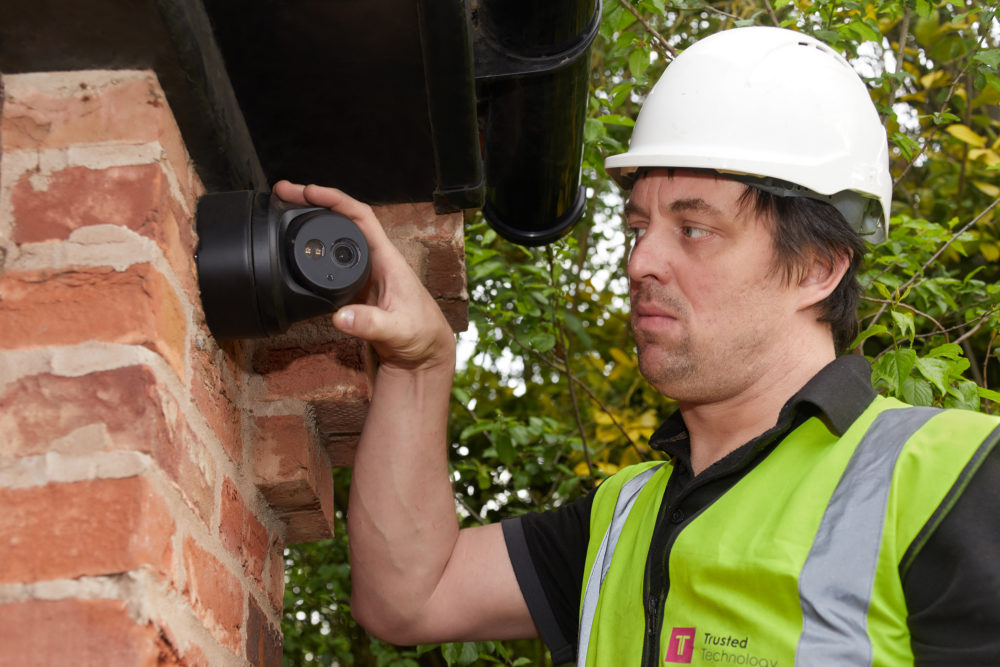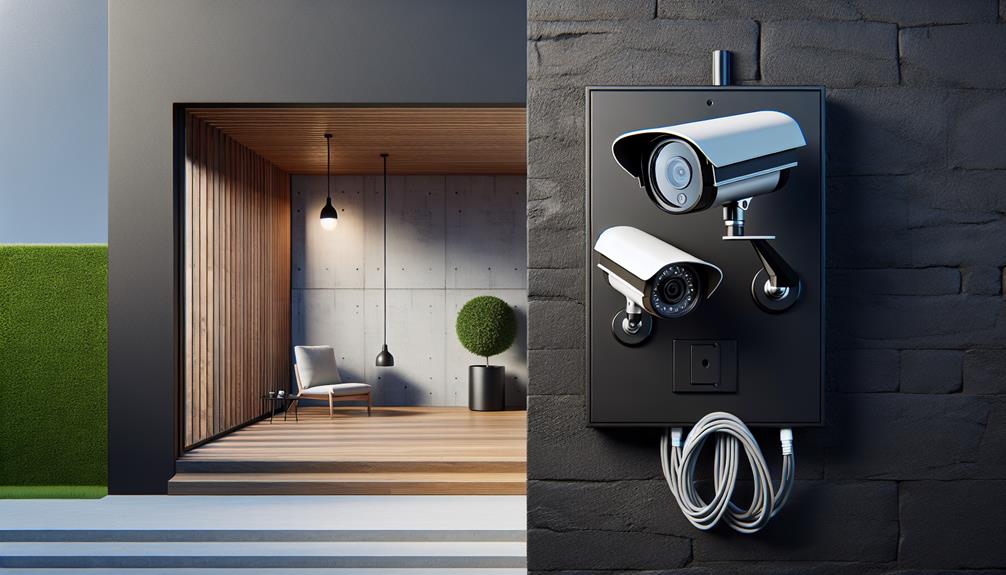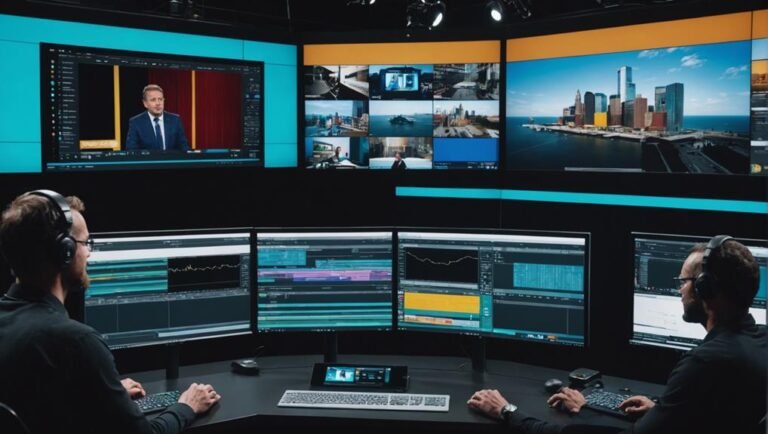When choosing between wireless and wired CCTV cameras, consider your needs. Wireless cameras are quicker to install and offer flexible placement but can face Wi-Fi interference. Wired cameras take longer to set up due to drilling and cable management but provide stable, high-quality video feeds. Wireless options need regular battery maintenance, whereas wired ones draw consistent power via Ethernet. Wireless cameras are great for renters and temporary setups, while wired cameras suit long-term surveillance in larger properties. Both types offer security features, yet wireless cameras might be more vulnerable to hacking if not secured correctly. Discover more advantages and drawbacks.
Installation Process
Installing wireless CCTV cameras is generally quicker and easier compared to their wired counterparts. You don’t have to deal with tangled cables or drilling holes through your walls. Just mount the camera, connect it to your Wi-Fi, and you’re good to go. This streamlined process lets you safeguard your time and energy, giving you the freedom to focus on what really matters.

Wireless cameras offer flexibility in placement since you’re not tethered by wires. You can easily move them around to find the perfect spot or adjust their position as your needs change. This adaptability is perfect for those who value independence and want a hassle-free setup.
On the other hand, wired systems require you to run cables through walls, ceilings, or along the floor. This can be a time-consuming and labor-intensive process, often requiring professional installation. You also have to plan the cable routes carefully to avoid potential obstacles and guarantee a clean, unobtrusive look.
Connectivity and Range
When evaluating connectivity and range, wireless CCTV cameras rely on Wi-Fi signals, which can be both an advantage and a limitation. You’ll love the freedom wireless cameras offer because you’re not tied down by cables. You can install them almost anywhere within the range of your Wi-Fi network. This flexibility means you can position cameras in places that might be hard to reach with wires.
However, Wi-Fi-based systems aren’t without their challenges. Walls, floors, and other obstacles can weaken the signal, potentially disrupting the connection. If your Wi-Fi network isn’t strong or covers a limited area, your cameras might experience lag or even lose connection altogether. To avoid this, you might need Wi-Fi extenders or a robust mesh network.
On the other hand, wired CCTV cameras provide a stable and consistent connection since they’re directly linked to your network through cables. You won’t have to worry about signal interference or range limitations. But, the downside is the lack of flexibility in camera placement because you’re constrained by the length of the cables.
Ultimately, your choice depends on your priorities: the freedom to place cameras wherever you want or the reliability of a wired connection.
Image and Video Quality
The image and video quality of your CCTV system can greatly impact its effectiveness in capturing and identifying important details. When it comes to wireless versus wired CCTV cameras, you’ll find some notable differences. Wireless cameras have made significant strides in recent years, offering improved resolution and clarity. However, they often face limitations due to bandwidth constraints and potential interference, which can sometimes affect the image quality, especially in high-traffic areas.
On the other hand, wired CCTV cameras typically offer more consistent and higher-quality video. They are directly connected to a recording device or monitor, ensuring a stable feed without the risk of signal disruption. This makes them ideal for situations where you need crystal-clear footage, such as in high-security zones or areas with a lot of movement.
That said, it’s crucial to take into account what you value more—freedom from wires and easy installation, or superior and reliable image quality. If you prioritize flexibility and a hassle-free setup, wireless cameras might be your go-to. But if you need excellent, uninterrupted video quality, wired cameras are likely the better choice. Ultimately, your decision should align with your specific needs and priorities.
Power Supply
Ensuring a dependable power supply is essential for the continuous operation of your CCTV system. When deciding between wireless and wired cameras, it’s important to take into account how each type gets its power. Wired cameras typically draw power through a direct connection, often using a Power over Ethernet (PoE) setup. This kind of power supply is reliable and eliminates the need for battery replacements.
On the other hand, wireless cameras offer more flexibility but come with their own set of power-related challenges. Most wireless cameras rely on batteries or require a nearby outlet. While battery-operated cameras give you the freedom to place them almost anywhere, you’ll need to monitor and replace or recharge the batteries regularly.
Consider these factors:
- Convenience: Wireless cameras can be placed in hard-to-reach locations without worrying about power cables.
- Upkeep: Battery maintenance is essential for wireless cameras, whereas wired cameras generally require less ongoing attention.
- Flexibility: Wireless cameras allow for easier re-positioning and relocation compared to their wired counterparts.
Reliability and Stability
Switching from power supply considerations, let’s now explore how wireless and wired cameras differ when it comes to reliability and stability. Wired cameras often provide a steadfast connection, ensuring consistent video feeds without interference. Once installed, you rarely have to worry about signal drops or the need to troubleshoot connectivity issues. This stability can be vital if you need continuous, uninterrupted surveillance.
On the other hand, wireless cameras offer freedom from cumbersome wiring, but this convenience can come at a cost. Wireless signals can be susceptible to interference from other electronic devices, walls, and even weather conditions. If you live in an area with heavy Wi-Fi traffic or frequent power outages, you might find your wireless camera’s reliability compromised.
However, not all is lost for wireless enthusiasts. Modern advancements in technology have significantly improved the reliability of wireless systems. Dual-band Wi-Fi, mesh networks, and more robust encryption protocols have all helped enhance performance. But even with these improvements, wired systems still hold the upper hand when it comes to raw stability.
Essentially, if you value utmost reliability and don’t mind the installation hassle, wired cameras are your go-to. If you crave flexibility and are willing to manage potential connectivity hiccups, wireless cameras provide the freedom you seek.
Cost Comparison
When weighing the costs, you’ll find that wired CCTV cameras often demand a higher initial investment due to installation and cabling expenses. These systems require professional installation, which can add up, especially if you have a large property. The need for extensive cabling and potential modifications to your home or business infrastructure contributes to the higher upfront costs.
On the other hand, wireless CCTV cameras usually come with lower initial costs. They’re typically easier to install, often allowing you to set them up yourself without hiring a professional. This not only saves you money but also gives you the freedom to place cameras in more flexible locations.
Here’s a quick comparison to keep in mind:
- Installation Costs: Wired cameras often require professional help, while wireless cameras can usually be set up by yourself.
- Equipment Costs: Wired systems can be more expensive due to the need for cables and other hardware, whereas wireless systems are generally more affordable.
- Flexibility and Freedom: Wireless cameras offer more flexibility in placement and can be moved easily if your security needs change.
Maintenance Needs
Maintaining your CCTV system involves different levels of effort depending on whether you choose wired or wireless cameras. With wired cameras, you’ll need to make sure fewer battery issues since they’re powered by a continuous electrical supply. However, you might face the hassle of checking and replacing cables, especially if they get damaged or worn out. You’ll also need to guarantee the connections stay secure, as loose wires can impact the camera’s performance.
On the other hand, wireless cameras offer more freedom but come with their own set of maintenance needs. These cameras depend on batteries, so you’ll need to keep track of their charge levels and replace or recharge batteries regularly. Wireless systems also rely on a stable Wi-Fi connection. If your signal weakens or encounters interference, you’ll need to troubleshoot your network.
While wireless systems provide flexibility in placement and less clutter, they require vigilance to maintain their battery life and connectivity. Wired systems, although more stable, demand attention to the physical integrity of the cables. Weighing these maintenance aspects will help you choose a CCTV setup that aligns with your need for freedom and ease of upkeep.
Security Features
Evaluating the security features of CCTV cameras is crucial to guaranteeing that your property stays protected. When comparing wireless and wired CCTV cameras, each has unique strengths and challenges.
Wireless cameras offer flexibility and are less invasive during installation. However, they depend on Wi-Fi, which can be a vulnerability. Hackers might target wireless systems if they’re not secured with strong passwords and encryption. To counter this, make sure your wireless camera system supports WPA3 encryption and regularly update the firmware.
On the other hand, wired cameras provide a reliable connection that isn’t susceptible to Wi-Fi interference or signal jamming. These cameras often have higher image quality due to a stable connection, but they can be compromised if someone cuts the cables.
Here are some essential security features you should consider for both types:
- Encryption: Ensure data transmission is encrypted to prevent unauthorized access.
- Two-Factor Authentication (2FA): Add an extra layer of security by requiring a second form of identification.
- Tamper Detection: Cameras should alert you if someone tries to disable or damage them.
Ultimately, your choice depends on balancing convenience with the level of security you need. Both options can effectively protect your property if you implement the right precautions.
Flexibility and Scalability
Flexibility and scalability are key advantages that can greatly impact your decision when choosing between wireless and wired CCTV cameras. If you crave freedom and adaptability, wireless cameras offer unparalleled benefits. Without the constraints of physical wiring, you can easily move and re-position your cameras as needed. This is perfect if you foresee changes in your surveillance needs or want to cover different areas over time.
Wireless systems also excel in scalability. Adding more cameras to your setup is straightforward, often requiring nothing more than a power source and a connection to your network. This makes it incredibly easy to expand your surveillance coverage as your needs grow. Conversely, wired systems can be less flexible and scalable. Adding new cameras often means additional wiring, which can be both time-consuming and disruptive.
However, it’s worth noting that wired systems do offer a stable and consistent connection, which can be vital for some applications. But if you prioritize freedom and ease of expansion, wireless cameras clearly have the upper hand. With wireless systems, you’re not boxed in by the limitations of cables, allowing you to adapt and grow your surveillance network with minimal hassle.
Ideal Use Cases
When deciding between wireless and wired CCTV cameras, understanding the ideal use cases for each can guide you to make the best choice for your specific needs. If you value flexibility and the ability to move your cameras around easily, wireless options are perfect. They’re great for renters or those who don’t want to drill holes and run cables through their home or office.
For areas where you need reliable, uninterrupted surveillance, wired cameras shine. They’re less prone to interference and signal loss, making them ideal for locations with a lot of wireless traffic or thick walls that could disrupt signals.
Here are some scenarios that highlight the strengths of each:
- Wireless Cameras:
- You rent your space and can’t make permanent changes.
- You want to monitor temporary setups, such as construction sites or events.
- You value ease of installation and want to avoid complicated wiring.
- Wired Cameras:
- You’re setting up a long-term surveillance system in a large property.
- You need a stable, high-quality video feed without the risk of signal dropouts.
- You prefer a more secure connection that’s less vulnerable to hacking.
Choosing the right type depends on what you prioritize—mobility and ease or stability and security.
Frequently Asked Questions
How Do Weather Conditions Affect the Performance of Wireless and Wired CCTV Cameras?
You’ll be amazed by how weather can wreak havoc on CCTV cameras! Rain and snow may interfere with wireless signals, while extreme temperatures can damage wired connections. Protect your cameras to maintain your sense of security and freedom.
Can Wireless CCTV Cameras Interfere With Other Household Wireless Devices?
Yes, your wireless CCTV cameras can interfere with other household wireless devices. They share the same frequency, causing potential signal disruptions. But don’t worry, you can usually change channels or frequencies to minimize interference.
What Are the Potential Health Risks Associated With Wireless CCTV Camera Radiation?
You’re worried about radiation from wireless CCTV cameras, but their emissions are typically low and considered safe. Just make sure you’re not placing them too close to where you spend long periods, like your bed or desk.
Are There Specific Brands That Are Better for Wireless Vs. Wired CCTV Cameras?
You’ll find certain brands excel in both categories. For wireless, Arlo and Nest offer exceptional freedom. If you prefer wired, Hikvision and Swann provide reliable security. Choose based on your need for flexibility or stability.
How Does the Lifespan of Wireless CCTV Cameras Compare to Wired Ones?
You’ll find that wired CCTV cameras generally last longer than wireless ones due to their consistent power supply and fewer components. However, wireless cameras offer greater flexibility and freedom, despite potentially shorter lifespans.



